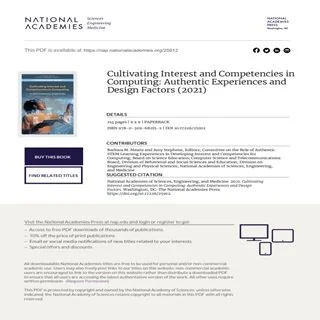By Barbra M. Means and Amy Stephens
Computing in some form touches nearly every aspect of day to day life and is reflected in the ubiquitous use of cell phones, the expansion of automation into many industries, and the vast amounts of data that are routinely gathered about people's health, education, and buying habits. Computing is now a part of nearly every occupation, not only those in the technology industry. Given the ubiquity of computing in both personal and professional life, there are increasing calls for all learners to participate in learning experiences related to computing including more formal experiences offered in schools, opportunities in youth development programs and after-school clubs, or self-initiated hands-on experiences at home. At the same time, the lack of diversity in the computing workforce and in programs that engage learners in computing is well-documented.
It is important to consider how to increase access and design experiences for a wide range of learners. Authentic experiences in STEM - that is, experiences that reflect professional practice and also connect learners to real-world problems that they care about - are one possible approach for reaching a broader range of learners. These experiences can be designed for learners of all ages and implemented in a wide range of settings. However, the role they play in developing youths' interests, capacities, and productive learning identities for computing is unclear. There is a need to better understand the role of authentic STEM experiences in supporting the development of interests, competencies, and skills related to computing.
Cultivating Interest and Competencies in Computing examines the evidence on learning and teaching using authentic, open-ended pedagogical approaches and learning experiences for children and youth in grades K-12 in both formal and informal settings. This report gives particular attention to approaches and experiences that promote the success of children and youth from groups that are typically underrepresented in computing fields. Cultivating Interest and Competencies in Computing provides guidance for educators and facilitators, program designers, and other key stakeholders on how to support learners as they engage in authentic learning experiences.
National Academies of Sciences, Engineering, and Medicine. 2021. Cultivating Interest and Competencies in Computing: Authentic Experiences and Design Factors. Washington, DC: The National Academies Press.



